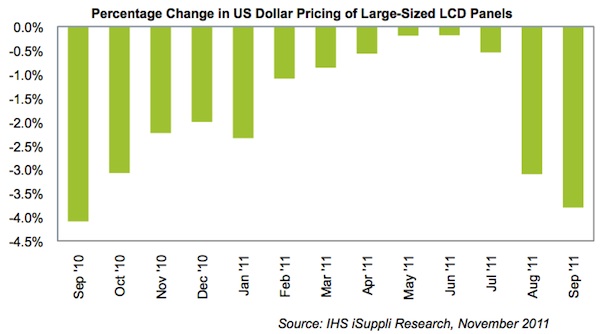 IHS iSuppli announced it reckons that the price of LCD TV panels declined nearly 5% in September 2011, the steepest drop in at least twelve months.
IHS iSuppli announced it reckons that the price of LCD TV panels declined nearly 5% in September 2011, the steepest drop in at least twelve months.
For more information visit: www.isuppli.com
Unedited press release follows:
LCD TV Panel Pricing Plunges at Fastest Rate in 12 Months
El Segundo, Calif., November 17, 2011—An unusually large decline of nearly 5 percent in the pricing of TV panels caused by anemic demand helped drive down overall prices of large-sized liquid crystal display (LCD) panels in September by the highest margin in a year, according to an IHS iSuppli LCD PriceTrak report from information and analysis provider IHS (NYSE: IHS).
The 4.9 percent contraction in LCD TV panel pricing was the steepest in at least 12 months, and also was the second straight month of decline greater than 4 percent. In August, LCD TV panel pricing fell 4.3 percent following dips averaging less than 1 percent in the prior four months. For an even bigger drop than that in September, one would have to go back a full 12 months to the same time last year, when LCD TV panel prices dived 5.2 percent in September 2010. The price reductions on TV panels were continuing in October as the end of 2011 approached.
The weak pricing in the TV sector meant that overall prices remained depressed for large-sized LCD panels, including those used for monitors and notebook computers.
Average LCD panel pricing for all three sectors—televisions, notebooks and monitors—in September was 3.8 percent lower than in August, as shown in the figure below. This marked the largest monthly decline since the 4.1 percent drop in September 2010.
“Slumping demand in Western Europe and North America are primarily to blame for the poor performance of LCD TV panels,” said Sweta Dash, senior director for liquid crystal displays researchat IHS. “Given the already faltering economies of those regions and the threat of a double-dip recession looming, global LCD TV shipments continue to suffer, impacting the TV panel market especially hard.”
Also contributing to the depressed market for LCD TV panels was the China factor. Panel purchases in China are mostly completed by August in anticipation of the country’s National Day celebrations in October—a weeklong event that normally sees a surge in consumer purchases, including those for televisions.
The next big splurge by China on LCD TV panels is not expected until the end of the year, timed to coincide with Lunar New Year festivities in late January of 2012.
In addition to the weak demand, the decrease in pricing is being spurred by moves among panel suppliers.
To boost LCD TV panel demand and entice TV manufacturers to buy more, panel suppliers offered very aggressive prices for the forthcoming Black Friday and Christmas holiday buying season in the United States and Europe—a traditional time of strong retail sales. But because TV brands also are setting highly competitive pricing to lure consumers in the weeks to come, that in turn has ratcheted up pressure on LCD TV panel manufacturers to lower their prices, especially on panels featuring the popular light-emitting diode (LED) technology. With pricing on some TV panels reaching the cash-cost level, panel manufacturers cut utilization rates in their fabs to 70 percent in September, the lowest level for the year. They also trimmed inventories in order to reduce oversupply and restore balance to the panel market.
September pricing for 40- and 42-inch LCD TV panels fell by $10 to $15 on average and was down a smaller 5 percent for 46- and 47-inch panels. Rates continued to drop in October, though at lower levels, and U.S. retailers are expected by Black Friday to offer 42-inch LCD TV sets featuring full high definition and light-emitting diode (LED) technology at less than $400.
Unlike TV panels, monitor and notebook panels saw September pricing fall more moderately, in both cases dipping 1.7 percent from their August levels. Monitor demand fared better in the corporate segment worldwide than among consumers, who stayed more focused on mobile devices like smartphones and tablets, such as Apple Inc.’s iPhone and iPad. Notebook panels, however, continued to struggle with weak numbers, and back-to-school sales were disappointing—again because of inroads made by smartphones and tablets into consumer households.
Overall large-sized LCD panel pricing continued to fall by another few percentage points in October, but pricing is expected to stabilize somewhat in November due to controlled panel production.
Learn more about this topic with the IHS iSuppli PriceTrak report entitled: “Panel Price Continued to Fall in October with Deepest Cuts for TV Panels.”
